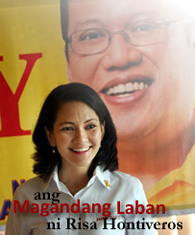This week we put the spotlight on Philippines Congresswoman Risa Hontiveros – the only representative from the straight community on this list – who is currently in the race for a Senate seat in the General Elections on May 10, and compatriot Sass Sasot, a long-time transgender activist who had recently addressed the United Nations on the subject of human rights, sexual orientation and gender identity.
This list is by no means exhaustive, but we are sure that this handful of extraordinary individuals will encourage and inspire you. If you know of anyone who you think is doing an amazing job for the greater good – whether they be activists or artists, entrepreneurs or entertainers, send us their details at editor@fridae.com.
Risa Hontiveros

Our only representative from the straight community in this year’s “Fridae's LGBT People to Watch” List comes in the form of a Congresswoman in the Philippine House of Representatives who is currently in the race for a Senate seat in the upcoming General Elections.
Risa Hontiveros entered politics after a distinguished career as a TV and radio journalist. Her active role in the on-going peace process between government and leftist forces in the nation’s south earned Hontiveros a Nobel Peace Prize nomination and compelled her to continue to fight for the rights of the marginalised.
In 2004 Hontiveros was elected to public office as a candidate for the progressive Akbayan Citizens' Action Party. She has since become on the party’s executive committee and a strident advocate of human rights for all, regardless of gender or sexuality. Hontiveros won the hearts of many within the Filipino pink community when she joined the chorus of voices in the “I Am Not Immoral” YouTube Campaign in response to the Commission on Elections’ (COMELEC) decision which dismissed a petition from the LGBT political party Ang Ladlad to take part in the 2010 National Elections. COMELEC’s decision was on the grounds that Ang Ladlad “tolerates immorality which offends religious beliefs”.
As the summer heat builds, Filipinos prepare to go to the polls on May 10 after bearing witness to months of campaigning punctuated with melodrama, intrigue, mudslinging and occasional violence that seems characteristic of the Pinoy political landscape. Another chapter of the Ang Ladlad-COMELEC saga unfolded with a Supreme Court decree in April that overturned COMELEC’s earlier decision, opening the door for Ang Ladlad to become the first Asian LGBT political party to participate in a general election.
While the Ang Ladlad verdict is a significant and historic breakthrough for the LGBT movement, the second-term public servant Hontiveros has a proven track record in navigating the tricky minefield of Philippine politics and has the greatest chance of making real progress, not only in regard to genuine recognition of the lives of LGBT citizens, but also on matters of reproductive health, gender equality and the environment.
æ: Why do you do this work?
I've decided to run for public office, specifically as party-list representative, in order to establish or amend a system of laws and policies that excludes citizens and favors the interest of a privileged minority. I think by engaging in political work inside and outside institutions like Congress, we can empower ordinary citizens and provide political opportunities for marginalised communities like LGBTs and women to exercise and enjoy their rights and welfare.
æ: How do you think you can make positive change happen in 2010?
I am currently running for higher office, and I am not exaggerating when I say that my candidacy is a grand adventure and a "magandang laban" (a good fight). We don't have the resources that a traditional politician could easily mobilise, but we are motivated by our belief that getting a seat in the Senate can scale up reforms that we were able to achieve in the House of Representatives. I am committed to push for the passage of the anti-discrimination bill and the reproductive health bill.
æ: What is your message to people who stand in your way?
We need to step back from the climate of irrational antagonism that has occluded the debates on controversial measures like the anti-discrimination bill and the RH bill and realise that these reform measures are fundamentally about human dignity. Being Catholic, I can understand where the Church and other religious groups are coming from. Democracy, however, means that we can agree to disagree, and do so with civility and with full respect to secular nature of our political institutions.
Risa Hontiveros can be contacted via www.risahontiveros.com.
With contributions from Laurindo Garcia, Patty Tumang and Sylvia Tan.
